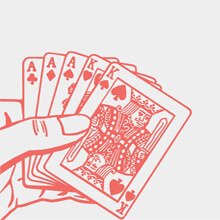
Playing Overcards in Poker
- Playing overcards beyond the flop depends on many different variables
- Make sure you know your opponents and who you are up against
- If you raise pre-flop, the majority of players will check to you on the flop
When you hold one of these starting hands such as A-K and the flop completely misses you, you are often faced with playing overcards in poker. It’s a thorny situation and it’s all-too-common. In this case, your cards are not good enough for you to continue in the hand with any degree of confidence, and yet they are just good enough to tempt you into wanting to stay. This is especially true if you raised pre-flop with your big cards.
The decision whether to continue playing overcards in poker beyond the flop, or give up now, depends on many different variables. Some things you should take into account; the texture of the flop, how many opponents are still involved in the hand, how much money is in the pot, your position, the playing style of your opponents, what is the action in front of you and the likely action behind you, and finally, do you have any other draws with your overcards?
First, you need to look at the texture of the flop. Is it ragged or coordinated? If the flop contains obvious straight and/or flush draws, draws that don’t match up in any way with your overcards, then it’s probably best for you to surrender now and stop playing overcards in poker for this hand. Also, if the flop contains other big cards, for example you hold A-K and the flop comes Q-T-6, then it’s much more likely that one of your opponents already has at least a pair. Because they, like you, are more liable to call before the flop with high cards.
Of course, it’s very important to consider how many other players are still in the hand after the flop. If you are only up against one or two opponents, then the flop may very well have missed them too, in which case your hand is probably still in the lead. The more opponents you have, the more likely it becomes that the flop has hit at least one of them. Also, you must consider the possibility that you could hit one of your cards and still lose. Essentially you are drawing to make top pair, and top pair, even with a good kicker, is less likely to win against many opponents.
In this situation of playing overcards in poker, it is also vitally important to know your opponents. If you are faced with calling a bet on the flop with just overcards, you would obviously be more inclined to call that bet from a loose-aggressive-habitually-bluffing player, than if the bet came from a player you knew to be tight and solid. Likewise, you must always keep in mind the probable range of hands your opponents might be playing, so that you can get an accurate sense of where you are in the hand, especially if you do hit your pair.
You’ll also want to take into account if you have any other draws, such as a gutshot straight or a backdoor (preferably nut) flush. In the example given above, where you have A-K and the flop is Q-T-6, you have an inside straight draw. Assuming that there are no flush draws on the board, a Jack would give you the absolute nuts, so now you have four more outs. But in this case you must bear in mind that if you do hit one of your Aces or Kings for top pair, that same card might give one of your opponents the Broadway straight. Again, you must pay close attention to how many other players are in the pot with you, and what kinds of hands they are apt to be playing.

Play overcards in poker strategically
If you were the preflop raiser, very often the other players will all check to you on the flop. With nothing but overcards, do you bet or check along? As always, it depends. If you think there is any realistic chance that a bet can win the pot for you right there – if you only have a small number of opponents and you believe they might fold – then go ahead and bet. Or if you are in last position and you think betting the flop can buy you a free card on the turn, you should strongly consider betting here as well.
When you flop overcards in hold’em, you should generally be more willing to stay in the hand if one or more of the following is true: the board is ragged, the pot is very large, you have few opponents, your can stay in cheaply, your opponents are not showing strength, you have other draws to go with your overcards. To stay or to quit can be a very tricky decision. Toss your overcards in the muck too often and you’ll miss out on some pots you could have won. Playing overcards in poker too much and you’ll be throwing money away. Making the right choice is often not easy, but if you want to be a long-term winner in Texas Hold’em, you must learn how to play overcards well.